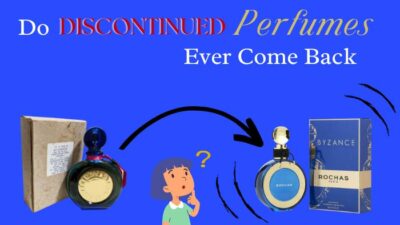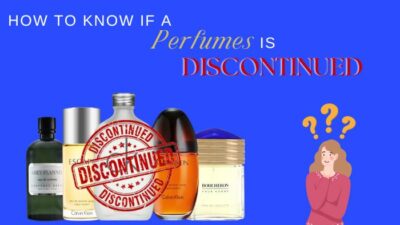You immediately get a feeling of purity and softness when you see the white floral jasmine. The smell of this mesmerizing flower also evokes the same sense. It is one of the flowers that smells as beautiful as it looks.
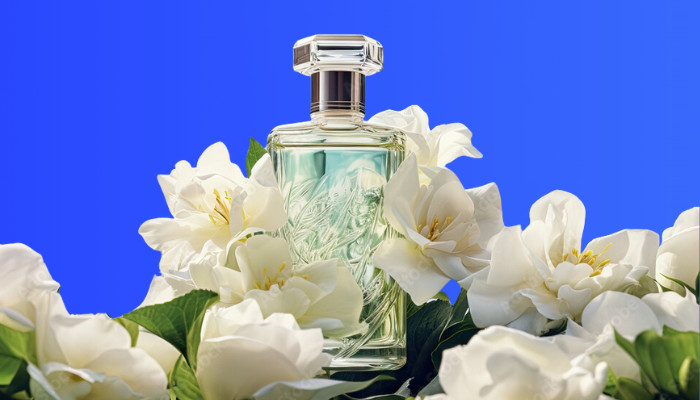
The white floral Jasmine represents romance as its sweet and soft characters have the charm to seduce you. It is cherished and loved in all cultures.
If you want to know how jasmine smells, and every other detail about it, do read the article till the end.
Origin And History Of Jasmine
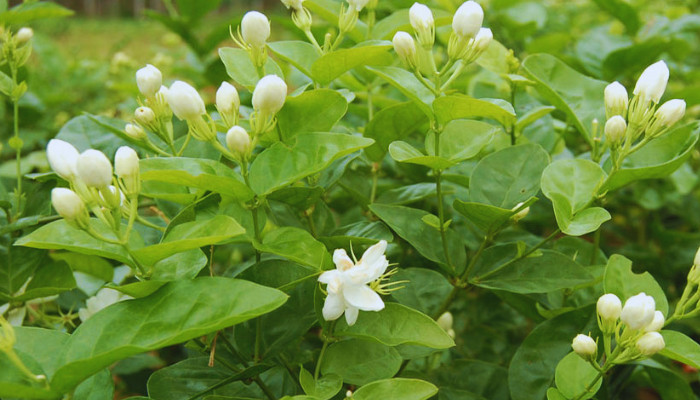
Jasmine is a star-shaped flower that blooms in shrubs(medium-sized trees) and grows in longer stems when support is available. This flower has a captivating floral aroma with some fruity and sweet facets. Its smell signifies love, passion, seduction, and purity.
The word jasmine comes from the Persian word, ‘Yasmin.’ It means “Gift From God”. Such an alluring and mass-appealing floral aura is truly a divine addition from God to Mother Earth.
There are around 200 species of jasmine’s genus of shrubs and vines available around the world, mostly in hot regions of Europe, Asia, Africa, and Australia. It is a part of the olive tree family.
The Jasmine flower is native to the tropical parts of Asia. Now it is widely cultivated in tropical and subtropical regions of Eurasia, China, and Oceania.
Jasmine comes in different shapes and sizes and has either evergreen or deciduous (short-lived) leaves. Evergreen leaves remain green and unbroken throughout the year, while deciduous leaves drop off the plant during the fall.
The length of this tree can be up to 20 feet long with white, yellow, and somewhat pink flowers and long, thin stems. The small flowers typically have a diameter of 2.5 cm forming star shapes with 5 petals.
Use Of Jasmine
The origin of jasmine essential oil traces back to Ancient India, where its aroma was vastly used for ayurvedic medicine and making scents to worship God.
Jasmine can survive for up to 15 or 20 years and are commonly farmed for their blossoms, which are used in a range of perfumes, lotions, soaps, and even infusions into green tea to give the beverage more richness in flavor.
Initially, the scent of jasmine was extracted through a process called Enfleurage. In this process, the fat substance of this flower is used to capture the aroma. Also, steam distillation used to be followed for a while.
However, now a chemical-based process is followed to derive the jasmine essential oil and it’s more efficient. In this technique, a solvent collects the oil from jasmine petals.
Although there are over 200 types of jasmine available worldwide, only a few types of jasmine flowers are used in making scent out of it.
Go through the following section to understand the magical aromatic journey of white floral jasmine, and I will suggest some fragrances with mesmerizing jasmine notes as well.
What Does Jasmine Smell Like?
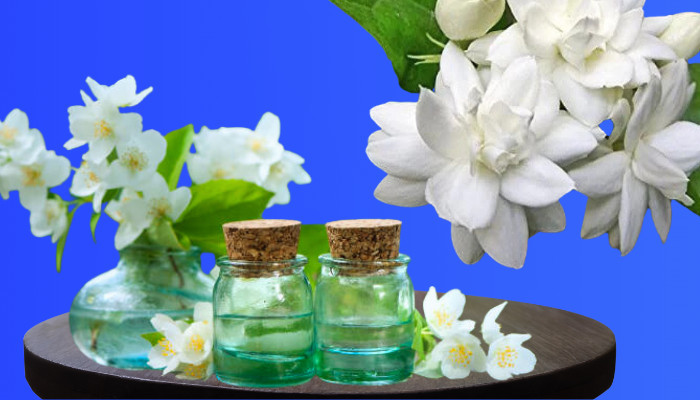
Jasmine flower offers an opulent floral aroma with a pleasingly sweet, fruity hint and a green undertone. This rich flowery scent gives a sensual feel with its animalistic and musky facets. The intense sweet aura of jasmine emits warmth in every sniff and creates a stimulating vibe.
The smell of jasmine isn’t just alluring and pleasing. It adds richness and sophistication to the wearer and gives a feeling of fulfillment.
Out of all floral notes, jasmine is the most famous one to be used in perfumes. Many perfumes have prominent jasmine facets from the top notes. Perfumers use it very frequently as they know how much the scent is loved by the users.
A most common type of jasmine or Jasminum officinale has a pleasing white floral sensation with some green and sweet hint underneath. It is also called the “poet’s jasmine” due to its intense aroma and sensual feeling.
As jasmine comes in many species, the smell of it can vary from one another. One smells fruitier than the other, sometimes, it gives off a bit of vanilla touch.
Apart from synthetic jasmine, only a few kinds of jasmine oil are widely extracted and used in fragrances.
In the following table, I will give a brief idea of the 5 types of jasmine that are commonly used in perfumeries:
| Type of Jasmine | Botanical Name | Accords | Fragrance Type |
|---|---|---|---|
| Royal/Spanish Jasmine | Jasminum grandiflorum | ● Rich floral smell. ● Has a creamy vibe like vanilla. ● Very sweet. ● Fruity. ● Gives a deep nuance. | It is mainly used in strong floral perfumes. Seductive scents and colognes also have a prominent portion of this note. |
| Arabian Jasmine | Jasmine sambac | ● Sheer floral smell. ● Slightly fruity. ● Sweet like honey. | This flower oil is heavily used in summer perfumes. Also, It’s a common accord in the tropical fragrance genre. |
| Common Jasmine | Jasminum officinale | ● Rich floral aura. ● Prominently musky. ● Gives a sensual feel. ● Pleasing sweet touch. | Another widely used element in women’s perfumes. Commonly added in mature and sensual fragrances. |
| Juhi Jasmine | Jasminum auriculatum | ● Rich resinous smell. ● Intense floral vibe. ● Has a playful tone. ● Profoundly green and herbal-type aroma. | Juhi jasmine is Frequently infused into luxurious and denser-smelling perfumes. This note is suitable year-round. |
| Star Jasmine | Jasminum multiflorum | ● Light, airy floral aura. ● Subtly sweet with a herby hint. | Mainly used in summer perfumes and body mists that have a subtle floral touch with some carnal hunch. |
Out of all, Jasmine sambac and Jasmine grandiflorum are the most widely used jasmine flowers in fragrances. Their aroma is the most intense and covers up to 40%-70% of a perfume’s smell considering the concentration.
Apart from fragrance, jasmine is a common element in scented candles. Its rich floral smell along with the sweet and herbal tones creates a sensual hunch in every whiff. Thus, its presence is highly valued in a homey ambiance and the luxury this flower adds is incomparable.
Its importance in aromatherapy and medicinal benefits aren’t negligible as well.
Jasmine’s popularity comes from its unique and versatile characters. It has a strong presence with a touch of softness and easily mixes with other ingredients.
Why Is The Smell Of Jasmine So Popular In Perfumery?
There are a huge number of notes available in the fragrance world. Have you ever wondered why Jasmine is so well-regarded among all of them?
Well, there are certain factors that make jasmine a well-loved flower in every aspect. And, when it comes to fragrances its aroma gives the finest nerve soothing experience.
It’s one thing that extracting oil from jasmine requires a huge amount of flowers and time. Over the years the process has also become cost and time-conducive.
The smell of jasmine is mesmerizing, carnal, and delightful. It’s a well-rounded flower note that activates all the good feelings in the human mind and gives a positive impression. This blossomy sensation lasts for a long time on the skin and offers a different vibe at different levels.
Due to its sensual creamy aroma and the animalic edge, jasmine is loved by people of every gender and age. Thus, the use of this flower is very common and considered luxurious.
Although there are other captivating notes, the awesomeness of jasmine is countless. Plus, its fusion with other fragrance notes creates a warm and inviting ambiance.
Jasmine’s aura gives a feeling of calmness and reduces stress in the mind. Overall, it’s very welcoming and thus the use of its oil in scented candles is common. It’s so mass-appealing that many iconic fragrances have a strong feature of jasmine.
Significance Of Jasmine Smell & Its Benefits In Aromatherapy
You would be surprised to know jasmine not only smells good but also has many advantages if you use it. Even adding it to your diet can be very beneficial to your health.
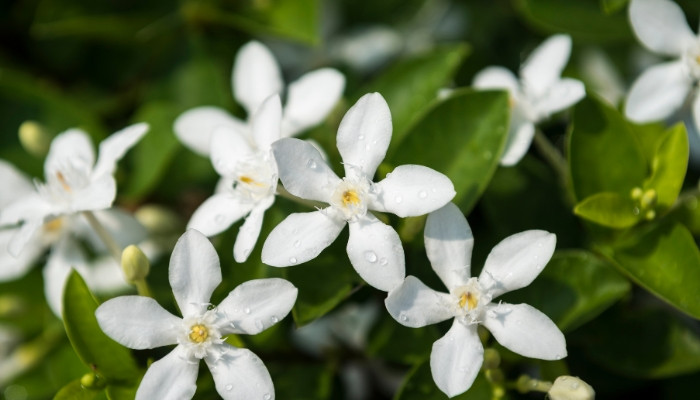
Here are some of the best benefits you can obtain from jasmine:
- Drinking jasmine tea regulates bowel movement and improves the digestive system.
- The antioxidants in jasmine tea help in reducing the risk of heart failure.
- Jasmine leaf contains epigallocatechin gallate and gallic acid, which aids in losing weight by increasing metabolism.
- It tames the chances of diabetes by regulating blood sugar.
- The aroma of jasmine oil makes the nerve feel relaxed and helps alleviate anxiety.
- Jasmine essential oil makes human beings feel more energetic and positive.
- It contains adaptogenic properties that adjust the neurological function and help in getting rid of insomnia.
- Jasmine lessens menopausal and PMS symptoms and balances the hormone. It aids in improving reproductive health.
What Scents Pair Well With Jasmine?
Although jasmine has a versatile and mass-appealing aromatic profile, its aroma becomes more enjoyable and satisfying when you pair it with other perfume notes.
Also, the presence of jasmine enhances certain facets and makes a fragrance more desirable.
In the following section, I will discuss some notes that go well with Jasmine:
- Bergamot: The refreshing smell of bergamot along with a sweet, floral hint of jasmine creates a mesmerizing aroma. Both of the notes boost each other’s aromatic flare.
- Lavender: Lavender needs no introduction. This soothing, aromatic, and herbal-smelling note becomes more sensual and inviting when jasmine adds its carnal floral elegance.
- Frankincense: An earthy, resinous, and refined smokey aroma of frankincense is mass-appealing. Its combination with jasmine has always created some timeless fragrances that are still in the hype.
- Ylang-Ylang: The fruity-floral, sweet smell of ylang-ylang and jasmine’s rich floral aura adds an incomparable dazzle to any scent. If you are looking for a luxurious fragrance, opt for the one with a fine blend of jasmine and ylang-ylang.
4 Best Jasmine Fragrances That Will Amaze You
Jasmine is regarded as being quite sensuous. It is considered exotic and alluring. Jasmine works as an aphrodisiac in some cultures because of its sensual properties.
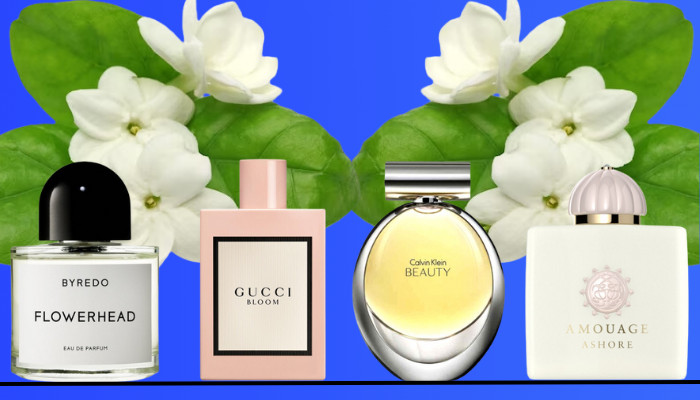
Here are the 4 iconic fragrances with prominent jasmine aromas:
1. Byredo Flowerhead
Given that this fragrance’s name is “Flowerhead,” it is clear that flowers are its primary subject.
Indian weddings, which mainly rely on flowers to decorate the bride and the venue, served as inspiration.
You will initially detect a hint of lemon with tuberose. The jasmine itself then appears to capture everyone’s attention. With a longevity of 8 to 10 hours, Flowerhead is made for spring and summer.
Sure, the scent is primarily composed of white flowers, but it is not overpowering. Also, it has a pleasing creamy and animalistic smell of musk in the dry-down that holds the jasmine notes prominently.
2. Gucci Bloom
This beautiful floral fusion by Alberto Morillas was released in 2017. It has a profound jasmine smell that will instantly drag all the attention towards you.
The jasmine notes in this fragrance linger for a long time and become more seducing over time. Its versatile blend of sweet, carnal, and herby white floral jasmine accord is suitable for all year.
It’s a popular scent and doesn’t feel overwhelming. Thus, there is a good amount of demand for similar perfumes to Gucci Bloom EDP.
3. Calvin Klein Beauty
When I first smelled Beauty, I was interested since it appeared like CK tried something new.
It has one of my favorite CK bottle designs. It is straightforward but gorgeous. There are only three notes in it.
Although the jasmine is delicate and light, it is strong enough to be noticed by people around you. It gets richer as it dries out. That lasts for a long time, almost 7 hours.
You can wear it on many occasions. Summer and spring days will suit this perfume more.
4. Amouage Ashore
The main ingredient in Ashore’s is jasmine, which is also mixed with citrus in the most exquisite way.
The jasmine is so lovely that it will instantly boost your self-confidence and make you feel graceful. When the sun is out and I am in the mood for flowers on a sunny day, I wear Ashore.
The jasmine is embraced by all the other notes in such a way that it is deserving of the title of one of the best-smelling Amouage perfumes.
Ashore is all about beautiful sunny days. It will remind you of your happy sunny brunches and picnics every time you open its cap.
FAQs
Does Jasmine Smell Good?
Yes, jasmine has a captivating sweet-floral smell that makes it very attractive and attention-luring.
Does Jasmine Smell Like Vanilla?
Not all jasmines, but Arabian jasmine or jasmine sambac has a musky, creamy, sweet touch which often gives a vibe of vanilla.
Is Jasmine A Masculine or Feminine Scent?
Jasmine-based fragrances are best for women because of their floral profile. But its aura has a subtle spicy and animalistic edge, which is mass-appealing and appreciated by both genders.
What Scent is Similar To Jasmine?
Ylang-ylang has a similar smell to jasmine. Its rich floral-fruity aroma is identical to that of jasmine.
Does Jasmine Only Smell Best At Night?
Not all of them. But certain jasmine flowers become more intense during nighttime when the temperature goes down and the airflow is lighter.
Does Jasmine Repel Anything?
Yes, Jasmine’s smell has a mosquito-repelling effect. It can be used in repellent solutions to enhance their effectiveness.
Is Jasmine Aphrodisiac?
Yes, from ancient times the smell of jasmine is considered to boost sensuality in both men and women.
Conclusion
Jasmine is the most common white floral oil used in perfumes for a long time. And why wouldn’t it be? The smell, attraction, and seduction jasmine can bring into a scent, no other flower note can do so. It also has a lot of other benefits if you use it.
If you have any further queries, please feel free to ask them in the comment section, and I would be happy to answer them.


